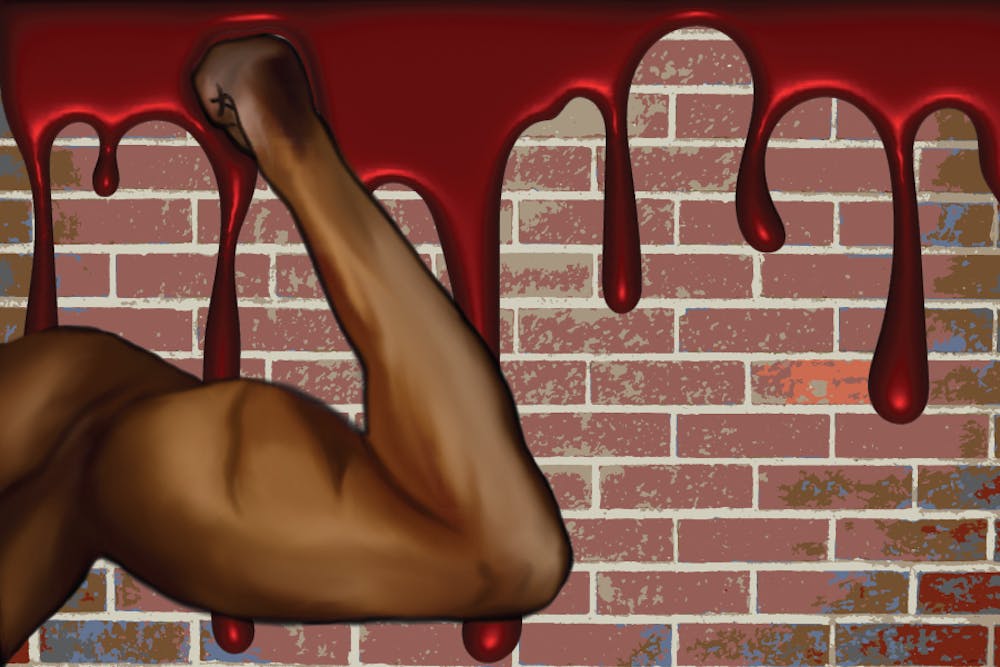Set in 1980s New Mexico, "Love Lies Bleeding," directed by Rose Glass, is a dark and nostalgic lesbian romance. But this isn't any ordinary box office love story — it's one that ends in blood.
Released in theaters on March 8, the A24 flick has since enticed a niche audience of film fanatics and members of the LGBTQ+ community hungry for representation. The film is racking up box office dollars, grossing over $7.5 million and counting worldwide, as Letterboxd fans scramble to give their take.
READ MORE: Letterboxd is an alternative social media platform for film buffs and students
The film tells the story of Lou, an unsociable gym manager who falls for an ambitious bodybuilder, Jackie, who is en route to Las Vegas in hopes of winning a bodybuilding competition. The two meet outside of the gym and quickly fall into a dark and sometimes abusive relationship shrouded by the intricacies of Lou's criminal family.
Lou and Jackie move in together shortly after meeting, synonymous with the "U-Haul Lesbian" stereotype. But as the film progresses, the stereotypes fizzle out into something more complex.
Lou gives Jackie steroids, and as her strength grows, so does her rage – and she begins to commit acts of violence. The couple finds it hard to pull apart from one another even though Lou is increasingly exposed to Jackie's aggressive tendencies.
In the midst of this chaos, Jackie calls her sister, sobbing, "Don't ever fall in love, okay?"
Josie DeBord, a sophomore studying film and media production, found that the film exposed a dark side of love without making it based on queerness.
"A lot of queer media is usually like, they're in love and the problem that they’re facing is that they're gay or that they have to come out," said DeBord said. "And I think this movie was really nice because it was just kind of like, 'yeah, and? They've got other stuff to deal with.' It was very refreshing, we can have a lesbian couple in this film and it’s not an issue really."
The film is shot through the eyes of a female director. Both Kristen Stewart (Lou) and Katy O'Brian (Jackie) identify as queer. Together, their perspectives help to portray a relationship that isn't only undefined by sexuality but celebrates love in its most intimate, raw forms.
"There was a moment where I felt a little uncomfortable, but I realized ... I only feel uncomfortable because it's such intimacy." said Nyle Rivera, a freshman studying film and media production. "You feel like you're intruding, but it's still tenderly shot."
Glass also makes an effort to use shock value, but in a way that suits the film's premise. There’s an emphasis on bizarre visuals that make audience members squeamish yet intrigued. One particularly squeamish ending shot had theater audiences audibly gasping.
Reflecting on that particular scene, Connor Murphy, a sophomore studying film and media studies and economics, said, "Would anyone do that in real life? Probably not, but it’s so striking and interesting for his character — it really makes him feel like a threatening, borderline psychotic guy. It’s so engaging to watch.”
The film is engulfed in a vibrant 1980s-themed setting that sets the tone, and potentially forecasts a trend revival. The outfits — like Jackie's muscle tank and Lou's baseball tee — suggest a rebirth of 80s fashion in a way that has more of a queer influence than the Stranger Things-esque style.
The late 80s dance music also helps to define the cultural landscape.
Andrew Dowell, a sophomore studying film and media production, explained that he’s not one to use Letterboxd- it puts films in boxes when, in reality, they’re usually too complex for that. But this film was an exception, and worthy of his acclaim.
"I love that kind of 80s/90s retro music," said Dowell. "And it's such a vibe in a cinematic space…I like listening to it as I'm getting ready for school or in the shower or whatever."
He said it was both the soundtrack and the film’s energy that made him so enthused. His favorite track was "Smalltown Boy."
"I pride myself on having good theatre etiquette, but never have I been so passionately moved to abandon my position so swiftly, cause damn this movie just made me want to dance," Dowell wrote in his Letterboxd review on the film.
Edited by Sophia Braccio, Sadie Buggle and Caera Learmonth.
Reach the reporter at ebmosier@asu.edu and follow @eleribmosier on X.
Like The State Press on Facebook and follow @statepress on X.
Eleri is a senior studying interdisciplinary studies, english and sociology. This is her third semester with The State Press. She has also worked in retail.




